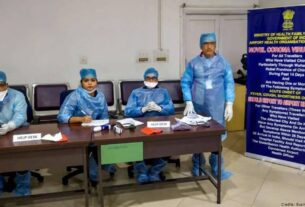Small NGOs that stitch clothes or bags and bigger NGOs that work on sustainability and infrastructure benefits have found themselves in a pickle as lockdown restrictions grip almost the entire country.
New Delhi: Rani, a single mother living in Mundka, stitches masks for a living ever since the start of the pandemic. In the beginning, she was able to earn Rs. 150-200 a day, but slowly her sales went down.
“We have a stock of some masks lying in our homes which no one is buying from us. We bought the cloth from the local tailors to make these masks and now we have to suffer these losses,” she said.
The second wave of the Covid-19 pandemic has put a halt to the operations of major non-governmental organizations (NGOs) helping women and the community in the country.
From small NGOs helping women stitch clothes or bags to NGOs that provide long-term employment and infrastructure benefits, all have found themselves in a pickle as lockdown restrictions grip almost the entire country.
No buyers for masks
There are about 50 odd women who work with Manmeet Kaur Dawar and her sister who run the Pink Foundation in Chandigarh and Ahmedabad. The foundation employs women to stitch or embroider cloth bags and other clothes which they then sell.
From 10 orders a month earlier, they are down to just two to three orders now.
“There has been a steep fall in our sales ever since the lockdown. All our work is shut and that is why the women, who are usually from low-income groups, are not able to earn their livelihood,” Manmeet said.
They, too, had tried to stitch masks to earn a basic livelihood for these women. However, the stock in their godown is piling up.
“The making cost of the mask is more than its price. Nothing comes out of selling masks,” she added.
Padmini Kumar, the Assistant Director at the Joint Women’s Program reiterates her experience. She agreed that they had sold a lot of masks earlier in March and April 2020 but a little later everyone started making masks which gave them a tough competition.
“There is a very small margin in making masks, so the women who stitch them hardly get anything in return. Also, the people are apprehensive about buying masks from NGOs as they question the quality of the cloth. Marketing is a problem for small NGOs,” Padmini said.
Saday Charitable Trust, a small organization from West Delhi, pays Rs. 15 for every cloth mask and Rs. 5 for every surgical mask to the women who sell it. Right now, they have a stock of Rs. 1000 masks that they are in the process of distributing.
“We have decided to start a fundraising campaign for these masks. We will encourage people to buy these masks for us and then we will pay the women from that money,” said Palak Soni, a member of the NGO.
Other Critical Work Has Also Taken A Hit
NGOs that were just recovering from the first wave of the pandemic, were hit hard by the emergence of the second one.
One such NGO was the Azad Foundation in Delhi. Amrita Gupta, the Director of Research, Advocacy and Communication there said that their main aim throughout this time was to keep the women drivers under its ‘Women With Wheels’ campaign employed. However, this is proving to be a much bigger challenge every day.
“We saw an opening in the transport sector of the e-commerce industry and we wanted to train our girls for that. We started virtual training of non-technical things like reading maps or communication but our technical training like driving or riding a two-wheeler have stopped completely,” she said.
“The second wave of the Covid-19 pandemic has affected not just the livelihood of women but has also impacted the infrastructure they live in,” said Veena Bhardwaj, Program Coordinator of the Mahila Housing Trust.
The organization helps support women and children by working on sectors like infrastructure, sustainability, urban governance and water. The lockdown measures have impacted their deliverables in these sectors as well.
“We were doing a lot of infrastructure work, like individual water connections in Delhi slums. But that work was stopped due to the surge in the Coronavirus cases. The material is not coming or is expensive. Our volunteers are not able to go on the ground and give training,” said Veena.
There are easy solutions right in front of us if we want to look at them, said Sunalini Kumar, Assistant Professor at the Ambedkar University, Delhi.
“Even in the best of times, the cloth masks or clothing industry is a very small sector. We need big solutions, like diverting funds from non-essential projects to health infrastructure which would not just provide medical facilities but also provide employment and skill training to millions of women and men,” she said.




